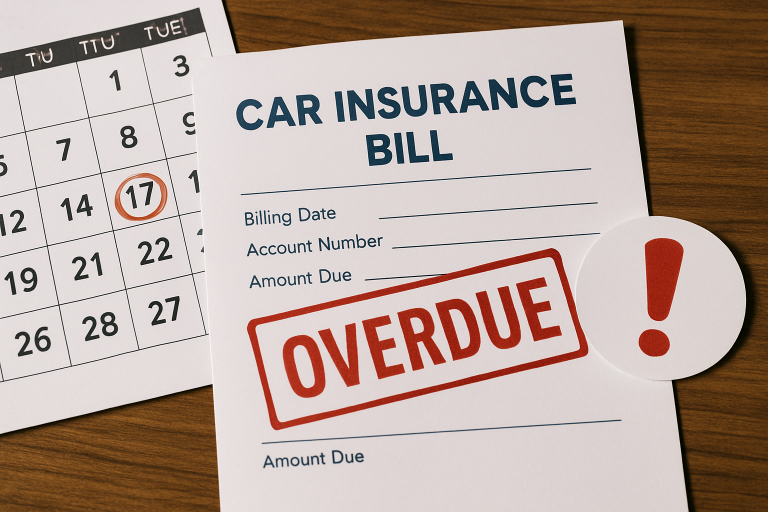Key Takeaways
- Missing a car insurance payment can lead to policy cancellation and legal penalties.
- A lapse in coverage may result in higher future premiums and difficulty obtaining insurance.
- Timely communication with your insurer can help mitigate negative outcomes.
Missing a car insurance payment can create more problems than just an overdue bill. It risks your financial health and legal standing and may even affect your ability to drive legally. For those who wonder what happens if you miss a payment, it’s important to understand all the ramifications to make informed decisions and avoid unnecessary complications.
Beyond the inconvenience, a simple missed payment can spiral into long-term issues like lapses in coverage, higher future insurance costs, and even legal trouble. Recognizing these risks early and knowing how to manage a missed payment is essential for every driver’s protection and peace of mind.
Many drivers may not realize that insurance companies have procedures and timelines set in place when a payment is missed. Quick action and open communication with your insurer can often prevent the worst-case scenarios. Being proactive ensures your insurance remains in force and minimizes the risks associated with missed payments.
If you’re facing financial challenges or administrative errors, knowing your rights and responsibilities regarding car insurance payments can keep you better protected on the road.
Grace Periods and Late Fees
Most car insurance companies offer a short grace period if you miss a payment, typically 7 to 30 days. This window gives you time to catch up on your premiums before your insurance is suspended or canceled. However, late fees may be imposed, making it more expensive to bring your account up to date. Late payments can quickly add up and complicate your financial planning, so it’s wise to act as soon as you realize a payment was missed.
Policy Cancellation and Coverage Lapse
If the overdue payment isn’t settled within your insurer’s grace period, your car insurance policy may be canceled. This results in a coverage lapse, meaning you’re driving uninsured until a new policy is restored or arranged. Even a brief lapse can create serious legal exposure and complications when you attempt to reinstate your policy or sign on with another provider. Cancellation procedures and timings will vary depending on your insurance company and local laws.
Legal and Financial Penalties
Driving without valid car insurance is illegal in most states and provinces. If you’re caught without coverage, you could face fines, license suspension, or even impoundment of your vehicle. For example, in Texas, first-time offenders may be fined up to $350. Repeat offenders can pay even higher fines and face additional penalties.
Impact on Credit Score
Insurers themselves do not report missed premium payments directly to credit bureaus. However, if your account remains unpaid and is sent to collections, this delinquency will appear on your credit report, damaging your credit score. A lower credit score can impact your ability to obtain credit cards, loans, and even new insurance policies in the future. Protecting your credit standing requires prompt communication with your insurer when you sense payment trouble.

Future Insurance Premiums
Insurance companies typically view a lapse in coverage as a sign of higher risk. As a result, any interruption in your insurance history may lead to higher premiums when you renew or shop for coverage elsewhere. Some insurers may even decline to cover you if you’re seen as unreliable or too risky due to previous lapses. Maintaining continuous, uninterrupted coverage is one of the most effective ways to qualify for better rates.
Steps to Take After Missing a Payment
- Contact Your Insurer Immediately: Don’t wait for the cancellation notice—explain your situation as soon as possible and ask about available options.
- Pay the Overdue Amount: If you’re able, settle the past-due balance right away to reinstate or preserve your policy.
- Discuss Payment Plans: If you’re struggling financially, request a temporary payment plan or hardship program from your insurer to keep your coverage.
Preventive Measures
- Set Up Automatic Payments: Automatic withdrawals reduce the risk of missed due dates and late fees.
- Monitor Your Account: Regularly check bank accounts and insurance portals to confirm payments clear correctly each month.
- Maintain an Emergency Fund: Keeping a small safety net in your savings can help cover premiums during tough months or unexpected expenses.
Staying organized and proactive with your car insurance payments is the best way to avoid unnecessary stress and safeguard your financial and legal well-being. When in doubt, reaching out to your insurance company and understanding your policy’s terms gives you the control and confidence you need to keep moving forward legally and securely on the road.
Consequences of Missing a Car Insurance Payment
Missing a car insurance payment triggers a cascade of immediate and long-term consequences that extend far beyond simple service interruption. While occasional financial difficulties affect most people, understanding the specific ramifications of lapsed auto insurance coverage enables better decision-making and risk management. Insurance companies operate on strict payment schedules, and missed payments activate predetermined protocols that can significantly impact your financial security, legal standing, and future insurability. The severity of these consequences varies based on grace periods, state regulations, and individual policy terms, but all missed payments carry substantial risk.
Immediate Coverage Disruptions and Legal Vulnerabilities
The moment your insurance payment becomes overdue, you enter a precarious position. Most insurers provide a grace period—typically 10 to 30 days depending on the company and state regulations—during which your coverage remains active despite non-payment. However, this grace period is not guaranteed in all policies, and some insurers distinguish between first-time late payments and repeated delinquencies. During the grace period, you remain technically covered for accidents, but the insurer will send notices demanding payment with specific deadlines for policy reinstatement.
Once the grace period expires without payment, your policy faces cancellation. This cancellation date marks when your legal coverage terminates, leaving you completely unprotected. If you continue driving after cancellation, you operate an uninsured vehicle—a serious legal violation in nearly every jurisdiction. The legal consequences of driving without insurance include substantial fines ranging from $500 to $5,000 for first offenses, with amounts varying significantly by state. Some jurisdictions impose these fines per day of non-compliance, creating exponentially increasing penalties.
Law enforcement can suspend your driver’s license immediately upon discovering you’re operating without valid insurance. Many states employ automated systems that flag uninsured vehicles through license plate recognition technology, making detection increasingly likely. License suspension triggers additional complications: you’ll pay reinstatement fees, potentially face increased insurance rates, and may need to file an SR-22 certificate—a document proving financial responsibility that obligates you to maintain continuous coverage for several years while paying premium surcharges.
Vehicle registration suspension accompanies insurance lapses in many states. When your insurer reports policy cancellation to the Department of Motor Vehicles, your registration may be automatically suspended. Driving with suspended registration compounds your legal violations, potentially resulting in vehicle impoundment. Recovering an impounded vehicle requires paying towing fees, storage charges, and all outstanding fines before release—costs that quickly escalate into thousands of dollars.
The most devastating immediate consequence involves accidents during uninsured periods. If you cause an accident while uninsured, you bear complete financial liability for all damages and injuries. Medical expenses, vehicle repairs, property damage, and legal fees become your personal responsibility. A single moderate accident can generate $50,000 to $100,000 in expenses, while serious accidents involving injuries can exceed $500,000. Without insurance coverage, creditors can pursue your assets, garnish wages, and file liens against property. These financial obligations don’t disappear through bankruptcy in many cases, particularly when injuries involve gross negligence.
Long-Term Financial Implications and Insurance Consequences
The financial repercussions of missed insurance payments extend years beyond the initial incident. Insurance companies classify drivers with coverage lapses as high-risk clients, resulting in dramatically increased premiums when seeking new coverage. Industry data shows that drivers with recent insurance lapses pay 30-50% higher premiums compared to those maintaining continuous coverage. This premium increase persists for three to five years, depending on your insurance history and state regulations.
Your insurance score—a metric insurers use to predict claim likelihood—suffers significant damage from coverage gaps. This score incorporates payment history, coverage continuity, and claim frequency. A single lapse can reduce your insurance score substantially, similar to how missed payments affect credit scores. Since insurers rely heavily on these scores when determining rates and coverage eligibility, the damage compounds across multiple insurance products, potentially affecting homeowners and renters insurance premiums as well.
Some insurance companies refuse to provide coverage to applicants with recent lapses, forcing you into high-risk insurance pools or state-assigned risk plans. These programs guarantee coverage availability but at premium rates that often exceed standard market rates by 100-200%. Additionally, these policies typically offer minimal coverage options, leaving you with basic liability limits that may prove insufficient during serious accidents.
Credit scores may deteriorate if missed insurance payments coincide with other financial difficulties. While insurance payments themselves don’t appear on credit reports, the financial circumstances causing missed insurance payments often affect other obligations. If the insurance company refers unpaid premiums to collections agencies, these accounts will damage your credit score, affecting your ability to secure loans, rent apartments, or even gain employment in industries that review credit history.
The administrative burden of reinstating cancelled policies creates additional financial strain. Reinstatement typically requires paying all past-due premiums plus late fees and reinstatement charges. Some insurers demand full payment for the remaining policy term upfront, eliminating monthly payment options. If reinstatement proves impossible with your original insurer, obtaining new coverage requires paying application fees, down payments, and potentially higher initial premiums across multiple applications before finding an affordable option.
Protective Measures and Recovery Strategies
Preventing coverage lapses requires proactive financial management and clear communication with your insurance provider. If you anticipate difficulty making payments, contact your insurer immediately—before the payment due date passes. Many companies offer hardship programs, payment extensions, or modified payment schedules for customers facing temporary financial challenges. Insurers prefer retaining existing customers over cancelling policies and acquiring new clients, creating negotiation opportunities.
Adjusting your coverage temporarily can reduce premium obligations during financial hardship. Increasing deductibles significantly lowers monthly premiums while maintaining legal compliance. If you own your vehicle outright, temporarily dropping comprehensive and collision coverage retains required liability protection at reduced cost. However, this strategy leaves you personally responsible for vehicle damage, so evaluate your financial capacity to absorb potential losses before implementing this approach.
Setting up automatic payments eliminates the risk of simply forgetting payment due dates. Link payments to checking accounts or credit cards with sufficient available funds, and set calendar reminders to verify adequate balances before scheduled withdrawals. Many insurers offer small discounts for autopay enrollment, providing additional savings alongside payment security.
If your policy has already cancelled, prioritize immediate reinstatement before driving again. Even a single day of uninsured driving carries enormous risk. If reinstatement with your current insurer proves impossible, immediately shop for replacement coverage. Multiple online platforms allow rapid comparison of quotes from various insurers. When applying for new coverage, honestly disclose previous lapses—providing false information constitutes insurance fraud and will void any future claims.
Consider usage-based insurance programs that charge premiums based on actual driving behavior and mileage. These programs often provide lower initial rates and can accommodate fluctuating financial circumstances better than traditional policies. Similarly, pay-per-mile insurance reduces costs for infrequent drivers, potentially preventing future payment difficulties.

